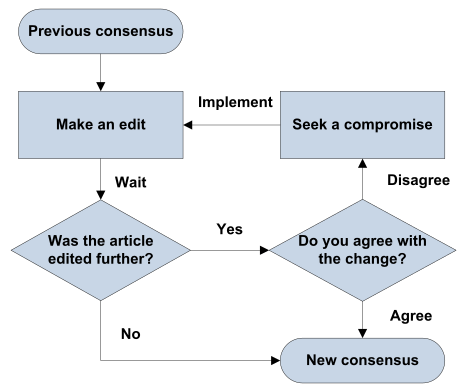User:TZubiri/sandbox
Wikipedia conflicts as chess matches
[edit]Wikipedia content most usually gathers attention from no users, it just seats there waiting to be read or edited. I only see an article when there's at least one person paying attention to it, me. If I cease to be an observer and modify the article, I attract attention.
The second observer has two options: to do nothing, considering my change positive, neutral, or not sufficiently damaging; or to engage, by placing a new modification. There are further two types of modifications, those that bring the article closer to its original state, or those that further change the article. If someone changes my article completely to its original state, he is now my opponent as opposed to an enemy in which case we would not be playing chess, but waging war.
As with chess, and many games, there is an offense/defense assymmetry, although in Wikipedia it's much more pronounced. The side changing an article is playing offense, and the side reverting is playing defense.
Unlike chess, wikipedia favours defense, it is conservative. This is because changes can damage an established article, as the article grows, the benefits brought by a change become smaller in comparision to the risks of damage to the rest of the article. Wikipedia's conservativeness grows with time, when entities are born, their mass is 0, and changes can only introduce benefits, as the project grows, changes will more likely to introduce damage that can even have consequences beyond the article that is being changed (for example by setting precedent).
Some player's specialize in one side, I specialize in Offense, not because I'm a liberal, but because as a conservative, my standards for changing are fairly high, so when I change I'm fairly certain that it's the best thing. I see many problems with wikipedia, but I only act upon those that have a good effort to impact ratio.
As an offensive player, today I write about defensive tactics, perhaps because I had to learn to deal with them, while my only relationship with offensive tactics is unconscious and organic.
Cited policies
[edit]The most common policies cited by defense are:
Defense policies
[edit]WP:CONSENSUS This policy can be cited with zero engagement and a no compromise total reversal. It requires an imbalance of effort, be very weary of engaging through the proposed course of action, writing in a talk page. This often ends with no responses (as there are only two players in a chess match), and can be hard to follow after. Another disadvantage is that we are left vulnerable to a Denial of Service, due to the effort assymettry. To defend against this, always change something when facing a reversal, then you can extract more information from your rival and respond accordingly. This also sets up an advantage if the game reaches arbitration by three revert-rule.
So far we are left with a pretty straight forward flowchart, as described in WP:3RR
 One should never revert a reversal immediately, without any change. A re-reversal should take at least as much effort as the original reversal took. To be safe, one should spend double the effort, this low enough to avoid denial of service and high enough that it can be considered fund matching, an incentive towards further collaboration. Although Chess is a zero-sum game, editing wikipedia is not, because the length of a match is considered a positive outcome, unlike chess, where all that matters is the result of the game. As such we should strive for deep collaborations.
One should never revert a reversal immediately, without any change. A re-reversal should take at least as much effort as the original reversal took. To be safe, one should spend double the effort, this low enough to avoid denial of service and high enough that it can be considered fund matching, an incentive towards further collaboration. Although Chess is a zero-sum game, editing wikipedia is not, because the length of a match is considered a positive outcome, unlike chess, where all that matters is the result of the game. As such we should strive for deep collaborations.
Coinage may be cited directly
[edit]By the nature of wikipedia, articles are centered around a word, every word first appeared in text somewhere, that first use may be cited directly. It is not necessary to cite a secondary source that speaks about first usage, just cite the first usage, for example:
Write:
" The phrase "RNA World" was first used by Nobel laureate Walter Gilbert in 1986, in a commentary on how recent observations of the catalytic properties of various forms of RNA fit with this hypothesis.[1]"
- ^ Gilbert, Walter (February 1986). "The RNA World". Nature. 319 (6055): 618. Bibcode:1986Natur.319..618G. doi:10.1038/319618a0. S2CID 8026658.
And not
" According to an ephemeriddes article by a digital newspaper, the phrase RNA world was first used by Nobel Laureate Water Gilbert in 1986. [1]"
Cut the midleman.
If an earlier usage of the word arises, it might be replaced.--TZubiri (talk) 01:28, 5 April 2021 (UTC)
- ^ The Westphalia Times 2016, no author https://westphaliatimes.com/articles/2016-06-11/30year-anniversary-of-this-revolutionary-theory?ads=yes&track=yes&paywall=yes

